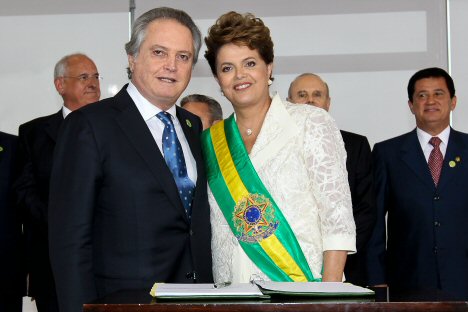
Rossi and Rousseff
Sandwiched between pages 78 and 79 of the current volume of Foreign Affairs is a sponsored essay on Brazilian President Dilma Rousseff. At the bottom of the article are pics of two business leaders and one high-profile minister, Wagner Rossi. Mr. Rossi was Brazil’s minister of agriculture, at least until last month. He became the fourth minister to be dismissed in 72 days. Shortly after her inauguration Dilma vowed to “clean up.” Evidently that was no idle threat: below the level of cabinet chief, over 100 senior and mid-level bureaucrats from the ministries of tourism, defense, and agriculture have been either fired by Rousseff or arrested on corruption-related charges. For the good ol’ boys of Brazilian politics it has been the summer of discontent.
Three weeks ago the Republic Party left Rousseff’s coalition after its all star Alfredo Nascimento, the transportation minister, was sent packing. That’s no big loss, but the PMDB–the biggest partner to Rousseff’s Worker’s Party government–is threatening to follow suit if the dismissals continue.
With the PMDB in uproar and analysts forecasting deadly attacks from the “wasp’s nest” that the president hit, Rousseff backpedaled. On August 24 she said that no more ministers would be fired.
Despite the obvious benefits of cleaner government, I believe Rousseff has made a major political mistake. In January she inherited a government ready to rein in inflation, champion Palestinian independence, and effectively triangulate relations between Beijing and Washington. Her first three months in office advanced on these fronts. Since then, however, her honeymoon has come to an end and her agenda is being tattered by the corruption scandals.
Ego has to play some role. Since being tapped by Lula as his successor, Dilma has been dogged by comparisons with him, and at times chided for living in his shadow. Obviously she wants her own success, but to strike out in a new direction like this is more of a risk than it is worth: opponents doubting her experience are becoming stronger as her approval ratings ebb, and fair-minded voters are unlikely to see Rousseff as a reformer when newspapers publish details of graft within her inner circle. President Rousseff should swallow the humility that goes with being a political novice, try to recover her footing and advance major initiatives with broad political support.